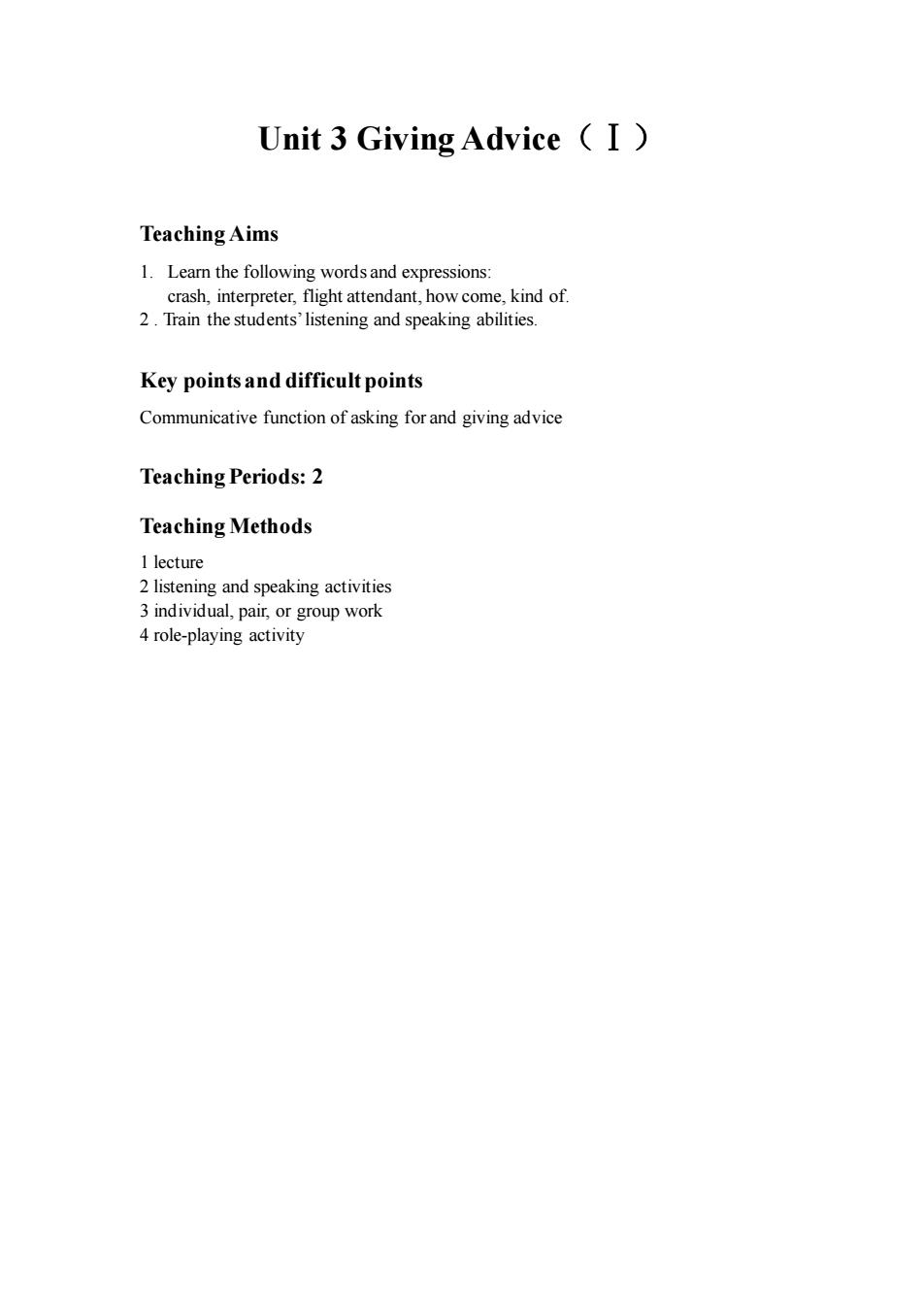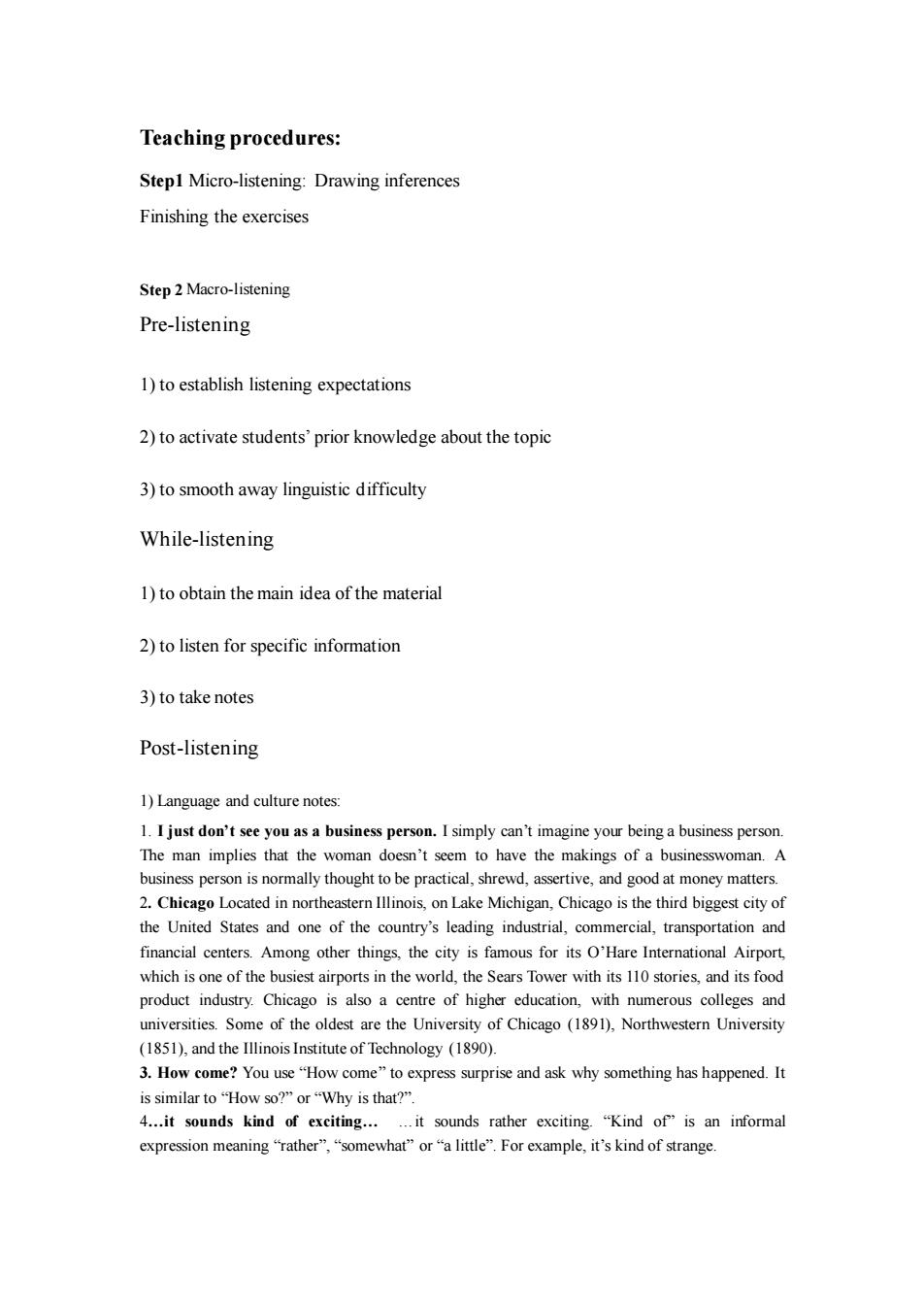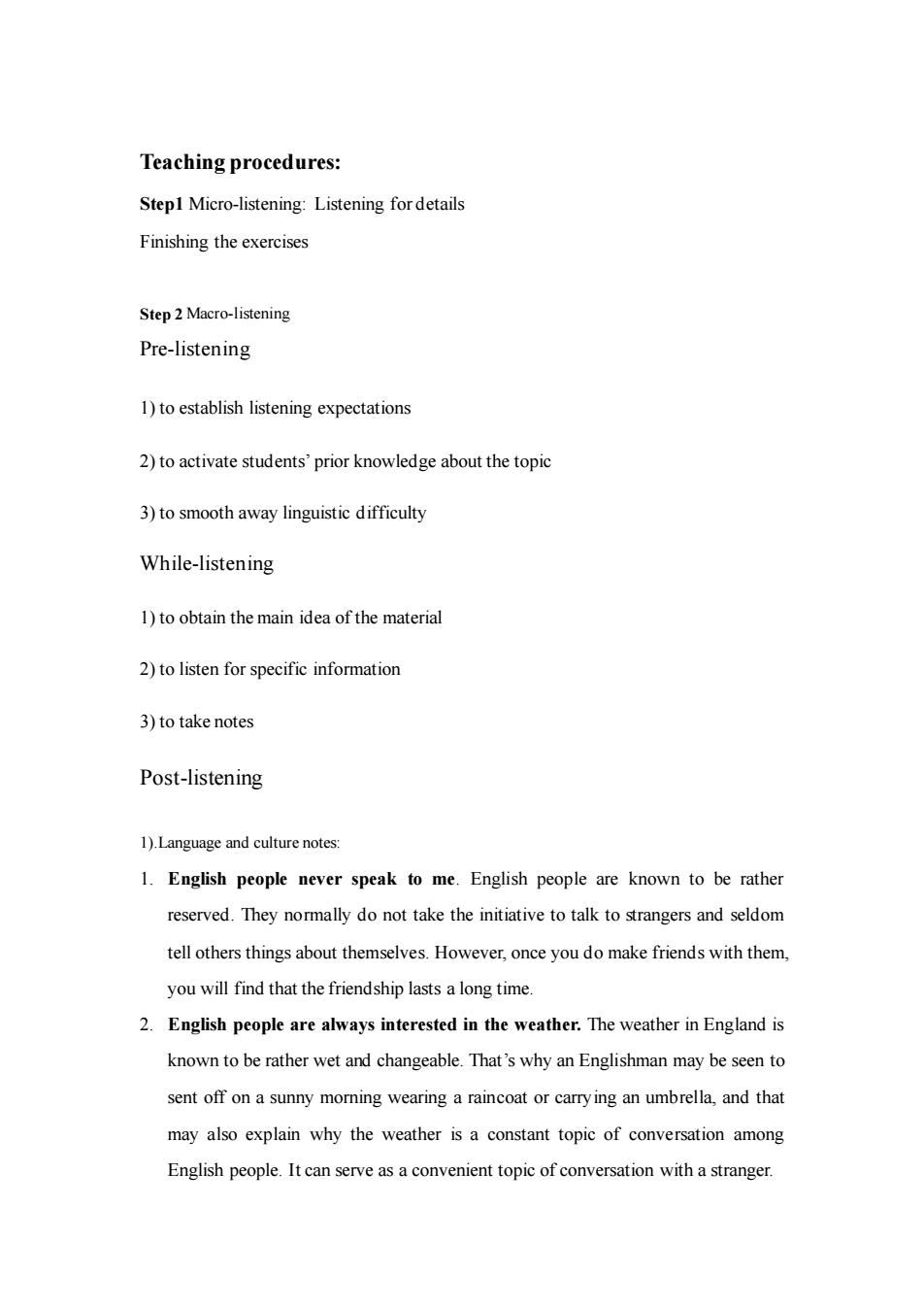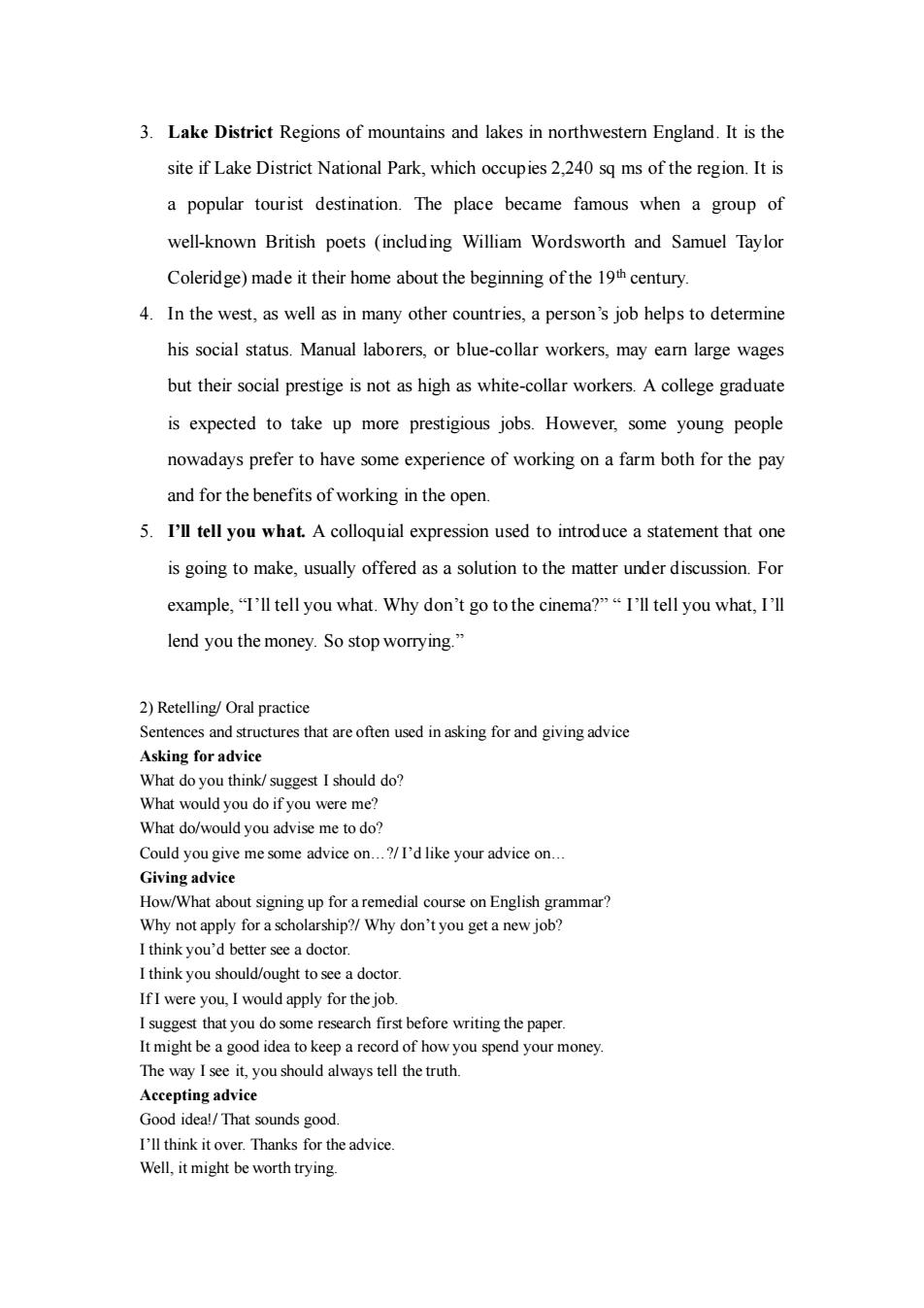
Unit 3 Giving Advice (I) Teaching Aims 1.Leamn the following words and expressions crash,interpreter,flight attendant,how come,kind of 2.Train the students'listening and speaking abilities. Key points and difficult points Communicative function of asking for and giving advice Teaching Periods:2 Teaching Methods 1lecture 2 listening and speaking activities 3 individual,pair,or group work 4 role-playing activity
Unit 3 Giving Advice(Ⅰ) Teaching Aims 1. Learn the following words and expressions: crash, interpreter, flight attendant, how come, kind of. 2 . Train the students’ listening and speaking abilities. Key points and difficult points Communicative function of asking for and giving advice Teaching Periods: 2 Teaching Methods 1 lecture 2 listening and speaking activities 3 individual, pair, or group work 4 role-playing activity

Teaching procedures: Stepl Micro-listening:Drawing inferences Finishing the exercises Step2 Macro-listening Pre-listening 1)to establish listening expectations 2)to activate students'prior knowledge about the topic 3)to smooth away linguistic difficulty While-listening 1)to obtain the main idea of the material 2)to listen for specific information 3)to take notes Post-listening 1)Language and culture notes: 1.I just don't see you asa business person.I simply can't imagine your being a business person. The man implies that the woman doesn't seem to have the makings of a businesswoman.A business person is normally thought to be practical,shrewd,assertive,and good at money matters. 2.Chieago Located in northeastern Ilinois,on Lake Michigan,Chicago is the third biggest city of the United States and one of the ounry'seading indust l.com mercial,transporta financial centers.Among other things,the city is famous for its O'Hare International Airport. which is one of the busiest airports in the world,the Sears Tower with its 110 stories,and its food product industry.Chicago is also a centre of higher education,with numerous colleges and universities.Some of the oldest are the University of Chicago (1891).Northwestern University (1851),and the Ilinois Institute of Technology (1890). 3.How come?You use"How come"to express surprise and ask why something has happened.It is similar to"How so?”or“Why is that?” 4...it sounds kind of exeiting....it sounds rather exciting "Kind of is an informal expression meaning"rather”,“somewhat'”or“a little”.For example,.it's kind of strange
Teaching procedures: Step1 Micro-listening: Drawing inferences Finishing the exercises Step 2 Macro-listening Pre-listening 1) to establish listening expectations 2) to activate students’ prior knowledge about the topic 3) to smooth away linguistic difficulty While-listening 1) to obtain the main idea of the material 2) to listen for specific information 3) to take notes Post-listening 1) Language and culture notes: 1. I just don’t see you as a business person. I simply can’t imagine your being a business person. The man implies that the woman doesn’t seem to have the makings of a businesswoman. A business person is normally thought to be practical, shrewd, assertive, and good at money matters. 2. Chicago Located in northeastern Illinois, on Lake Michigan, Chicago is the third biggest city of the United States and one of the country’s leading industrial, commercial, transportation and financial centers. Among other things, the city is famous for its O’Hare International Airport, which is one of the busiest airports in the world, the Sears Tower with its 110 stories, and its food product industry. Chicago is also a centre of higher education, with numerous colleges and universities. Some of the oldest are the University of Chicago (1891), Northwestern University (1851), and the Illinois Institute of Technology (1890). 3. How come? You use “How come” to express surprise and ask why something has happened. It is similar to “How so?” or “Why is that?”. 4…it sounds kind of exciting… …it sounds rather exciting. “Kind of” is an informal expression meaning “rather”, “somewhat” or “a little”. For example, it’s kind of strange

2)Retelling/Oral practice Step 3 Home Listening Unit 4 Giving Advice (II) Teaching Aims 2.Leam the following words and expressions sightseeing,accountancy,application,appeal to. 2.Train the students'listening and speaking abilities. Key points and difficult points Communicative function of asking for and giving advice Teaching Periods:2 Teaching Methods 1lecture 2 listening and speaking activities 3 individual,pair,or group work 4role-playing activity
2) Retelling / Oral practice Step 3 Home Listening Unit 4 Giving Advice(Ⅱ) Teaching Aims 2. Learn the following words and expressions: sightseeing, accountancy, application, appeal to. 2 . Train the students’ listening and speaking abilities. Key points and difficult points Communicative function of asking for and giving advice Teaching Periods: 2 Teaching Methods 1 lecture 2 listening and speaking activities 3 individual, pair, or group work 4 role-playing activity

Teaching procedures: Stepl Micro-listening:Listening for details Finishing the exercises Step2 Macro-listening Pre-listening 1)to establish listening expectations 2)to activate students'prior knowledge about the topic 3)to smooth away linguistic difficulty While-listening 1)to obtain the main idea of the material 2)to listen for specific information 3)to take notes Post-listening 1).Language and culture notes: 1.English people never speak to me.English people are known to be rather reserved.They normally do not take the initiative to talk to strangers and seldom tell others things about themselves.However,once you do make friends with them, you will find that the friendship lasts a long time. 2.English people are always interested in the weather.The weather in England is known to be rather wet and changeable.That's why an Englishman may be seen to sent off on a sunny moming wearing a raincoat or carrying an umbrella,and that may also explain why the weather is a constant topic of conversation among English people.It can serve as a convenient topic of conversation with a stranger
Teaching procedures: Step1 Micro-listening: Listening for details Finishing the exercises Step 2 Macro-listening Pre-listening 1) to establish listening expectations 2) to activate students’ prior knowledge about the topic 3) to smooth away linguistic difficulty While-listening 1) to obtain the main idea of the material 2) to listen for specific information 3) to take notes Post-listening 1).Language and culture notes: 1. English people never speak to me. English people are known to be rather reserved. They normally do not take the initiative to talk to strangers and seldom tell others things about themselves. However, once you do make friends with them, you will find that the friendship lasts a long time. 2. English people are always interested in the weather. The weather in England is known to be rather wet and changeable. That’s why an Englishman may be seen to sent off on a sunny morning wearing a raincoat or carrying an umbrella, and that may also explain why the weather is a constant topic of conversation among English people. It can serve as a convenient topic of conversation with a stranger

3.Lake District Regions of mountains and lakes in northwestern England.It is the site if Lake District National Park,which occupies 2.240 sq ms of the region.It is a popular tourist destination.The place became famous when a group of well-known British poets (including William Wordsworth and Samuel Taylor Coleridge)made it their home about the beginning of the 19th century. 4.In the west,as well as in many other countries,a person's job helps to determine his social status.Manual laborers,or blue-collar workers,may earn large wages but their social prestige is not as high as white-collar workers.A college graduate is expected to take up more prestigious jobs.However,some young people nowadays prefer to have some experience of working on a farm both for the pay and for the benefits of working in the open. 5.I'll tell you what.A colloquial expression used to introduce a statement that one is going to make,usually offered as a solution to the matter under discussion.For example.I'll tell you what.Why don't go to the cinema?I'll tell you what,I'll lend you the money.So stop worrying." 2)Retelling/Oral practice Sentences and structures that are often used in asking for and giving advice Asking for advice What do you think/suggest I should do? Could you give me some advice on...?/I'd like your advice on.. Giving advice How/What about signing up for a remedial course on English grammar? Why not apply don'tyou geta new job? Ithinkyou'd better I think you should/ought to see a doctor. IfI were you,I would apply for the job. Isuges that you dosome research first before riting the paper It might be a good idea to keep areord of how you spend your money The wayIsee it you should always tell the truth Accepting advice Good idea!/That sounds good. I'll think it over.Thanks for the advice. Well,it might be worth trying
3. Lake District Regions of mountains and lakes in northwestern England. It is the site if Lake District National Park, which occupies 2,240 sq ms of the region. It is a popular tourist destination. The place became famous when a group of well-known British poets (including William Wordsworth and Samuel Taylor Coleridge) made it their home about the beginning of the 19th century. 4. In the west, as well as in many other countries, a person’s job helps to determine his social status. Manual laborers, or blue-collar workers, may earn large wages but their social prestige is not as high as white-collar workers. A college graduate is expected to take up more prestigious jobs. However, some young people nowadays prefer to have some experience of working on a farm both for the pay and for the benefits of working in the open. 5. I’ll tell you what. A colloquial expression used to introduce a statement that one is going to make, usually offered as a solution to the matter under discussion. For example, “I’ll tell you what. Why don’t go to the cinema?” “ I’ll tell you what, I’ll lend you the money. So stop worrying.” 2) Retelling/ Oral practice Sentences and structures that are often used in asking for and giving advice Asking for advice What do you think/ suggest I should do? What would you do if you were me? What do/would you advise me to do? Could you give me some advice on…?/ I’d like your advice on… Giving advice How/What about signing up for a remedial course on English grammar? Why not apply for a scholarship?/ Why don’t you get a new job? I think you’d better see a doctor. I think you should/ought to see a doctor. If I were you, I would apply for the job. I suggest that you do some research first before writing the paper. It might be a good idea to keep a record of how you spend your money. The way I see it, you should always tell the truth. Accepting advice Good idea!/ That sounds good. I’ll think it over. Thanks for the advice. Well, it might be worth trying

Well.I think I'll have to think about it. I'mot sure that will work/I'mafraid that might not help.But thank youall thesme I'm not sure really.But thanks anyway. Step 3 Home Listening
Well. I think I’ll have to think about it. I’m not sure that will work./ I’m afraid that might not help. But thank you all the same. I’m not sure really. But thanks anyway. Step 3 Home Listening